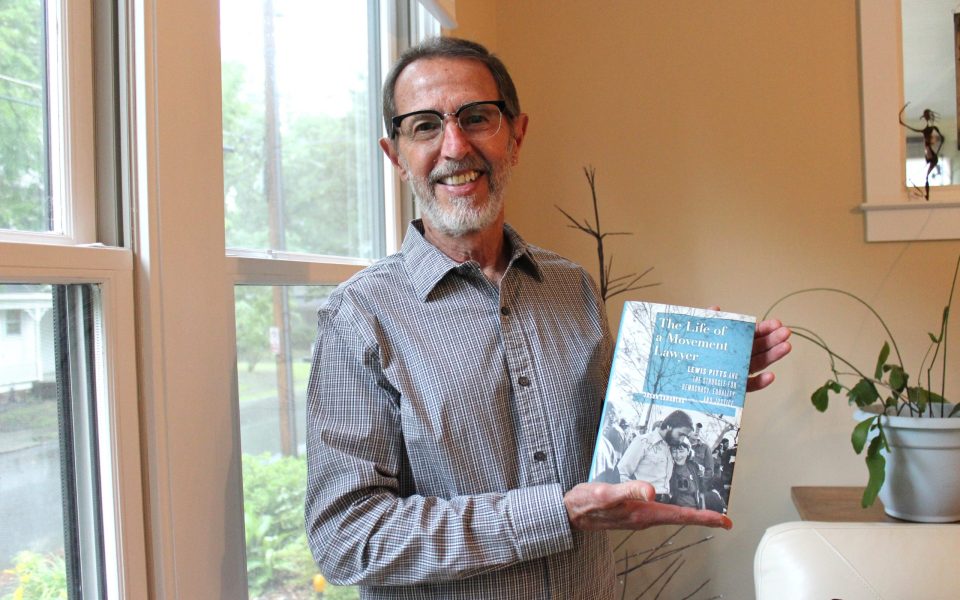Featured photo: While Lewis Pitts is retired now, having resigned from the bar in 2014, the community activist has a long and storied 40-year career working in “movement lawyering.” (photo by Sayaka Matsuoka)
“When I talked to Lewis, I felt better about things.”
That’s the enduring sentiment that runs through a new book by civil rights lawyer Jason Langberg that chronicles the life of Greensboro activist and former movement lawyer Lewis Pitts.
The Life of a Movement Lawyer: Lewis Pitts and the Struggle for Democracy, Equality, and Justice, which hits shelves across the country on May 16, is a seven-and-a-half-year project by Langberg, stemming from the lawyer’s personal relationship working with Pitts.
“I first met Lewis back in 2005, I think,” Langberg recounts during a recent interview. “I was a law student at the time, and I was interested in coming to North Carolina.”

Langberg remembers visiting family in Asheville and connecting with Pitts, who was working as an attorney for Legal Aid at the time.
“We met for coffee one morning, and we sat there for at least a couple of hours if not longer,” Langberg says. “And I decided at that meeting, That’s the guy I want to work for.”
As Langberg started working with Pitts in 2009, Pitts’ mentorship blossomed into friendship and became a catalyst for hope for Langberg.
“When I talked to Lewis, I felt better about things,” Langberg says. “I recommitted to social justice work and I thought, I’m sure others would like this spiritual Gatorade, as Lewis calls it. I spent time being inspired by him.”

While Pitts is retired now, having resigned from the bar in 2014, the community activist has a long and storied 40-year career working in what Langberg calls “movement lawyering.”
From representing anti-nuclear war activists in Oklahoma to fighting for residents in Daufuskie Island, SC, to seeking justice for the survivors of the Greensboro Massacre, the book chronicles Pitts’ career while weaving together the stories of activists across the country.
“The book doesn’t fit in a nice category,” Pitts says. “But I think it offers a compelling formula linking organizing with litigation, not because you believe in the legal system… but to show that you can use law, and it’s about a collective effort and how that can defend a movement.”
And that’s why, even though the book is technically a biography about Pitts’ life, the stories of those he worked with, fought alongside and sought justice for really shine through.
“It’s about Lewis, but Lewis is the string in a pearl necklace and the pearls are all of the clients that Lewis was working with,” Langberg says.
In interviews with people Pitts represented, Langberg says that the one thing almost every person told him was about how meeting and working with Pitts made them feel.
“They would tell me about how they remember feeling seen,” Langberg says. “They would say, ‘I remember feeling solidarity.’ ‘I felt like I had never felt before.’ ‘I had partners.’ ‘I had somebody to help me have a voice and feel seen.’”
One interviewee, Jim Primdahl talked about hitchhiking with Pitts as an anti-nuclear war activist. The survivors of the Greensboro Massacre, Rev. Nelson Johnson and Joyce Johnson, shared their experiences of the tragic event in which their friends were killed by Nazis and members of the KKK. Yvonne Wilson of Daufuskie Island, who was fighting against corporations from building in her hometown, talked lovingly about Pitts like he was her own son.
“You can feel the goodness and love for Lewis oozing out of them,” Langberg says.
More recently, Pitts has been involved in racial justice work including pushing for justice for the Smith family after the killing of Marcus Deon Smith. He’s also been active in pro-Palestine, anti-genocide protests in the last few months.

In that way, Langberg says that although the book spans the last four decades, the stories contained within also reflect so much of America’s current society.
“Every story has a corollary in the ’80s, ’90s and especially today,” Langberg says. “Lewis, 30 to 40 years ago, was dealing with police misconduct, the US meddling in other countries’ affairs, imperialist violence, voting fraud myths, white supremacy, the fight against climate change and even free speech issues.”
The other reason Langberg believes that the book will be compelling to readers, especially to young activists, is because Pitts exemplifies someone who creates change without being a famous senator or Supreme Court justice. He’s one of us.
“I think there needs to be more stories about people who most folks have never heard of just doing amazing things,” Langberg says. “The story is just to be a really good person who is invested in democracy and community mobilization. I want people to read it and say, ‘I can do that.’”
Learn more about The Life of a Movement Lawyer: Lewis Pitts and the Struggle for Democracy, Equality, and Justice and order online at lewispittsbiography.com. Copies can also be bought at Scuppernong Books in Greensboro and at Bookmarks in Winston-Salem.
Join the First Amendment Society, a membership that goes directly to funding TCB‘s newsroom.
We believe that reporting can save the world.
The TCB First Amendment Society recognizes the vital role of a free, unfettered press with a bundling of local experiences designed to build community, and unique engagements with our newsroom that will help you understand, and shape, local journalism’s critical role in uplifting the people in our cities.
All revenue goes directly into the newsroom as reporters’ salaries and freelance commissions.


Leave a Reply